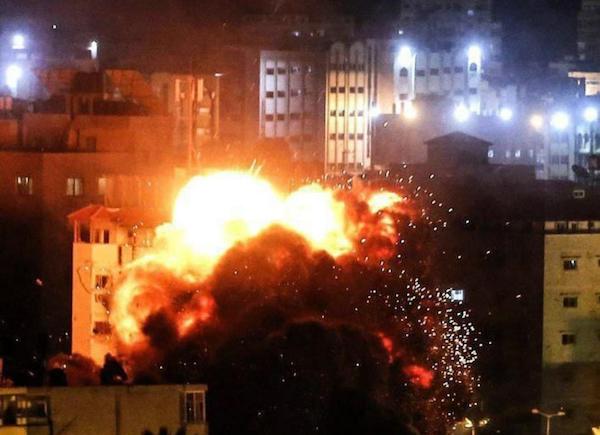
Gaza’s electricity supply has been cut to around three hours a day as Israeli bombing of the besieged Palestinian enclave has continued for ten consecutive days.
Heavy damage was reported after an Israeli drone targeted the a neighbourhood south-east of Gaza City, while civilian property was damaged by an Israeli warplane as it bombed the town on Beit Hanoun.
Further missile strikes targeted the town of Beit Lahia in the northern Gaza Strip. Israel insisted it was responding to two balloon devices sent up from the Palestinian territory. The launching of the balloons was a symbolic effort to draw attention to the deteriorating situation in Gaza.
Some two million Palestinians live in the Gaza Strip, which has been under a lethal Israeli siege for the past 13 years. Israel subjects the territory to bombing whenever its people resist or protest collective punishment measures.
Since the beginning of August, Israeli warplanes have bombarded the Gaza Strip with bombing missions against agricultural land and what Israel claims are Hamas posts.
The Israeli human rights group Gisha warned that hospitals, schools, workshops and quarantine facilities are also being impacted by the current fuel cuts. While most hospitals in the Strip are supplied with 24-hour electricity through the main power plant, Gisha says it is unclear if that will be sustained.
Gaza’s health ministry warned that power outages at hospitals would “have serious repercussions on the lives of premature babies in nurseries and intensive care and kidney failure patients.”
Israel’s fuel ban will also affect factories in Gaza, where the economy has already been all but destroyed by 13 years of blockade and repeated military assaults.
Covid-19 quarantine facilities in Gaza, which are currently housing some 2,000 people, will also have no more than four hours a day of electricity.
Last week, Israel closed the Kerem Shalom checkpoint, the sole point of transfer for commercial goods in and out of Gaza, for all but the transfer of “vital humanitarian aid.”
Fawzi Barhoum, a spokesperson for Hamas, which runs Gaza’s internal affairs, assigned Israeli occupation forces “the full responsibility” for the “results and repercussions” of the tightening of the siege and cutting of the fuel.
Last week, Israeli warplanes struck a school in Gaza City run by UNRWA, the United Nations agency for Palestine refugees, causing damage and disrupting school activities.
“How can a school surrounded by three UN schools and a UN health center and considerable distance to known military sites be hit by accident?” Matthias Schmale, who heads the agency in Gaza, asked on Twitter.
Students were evacuated from the school, and police teams are working to remove remnants of the missile from campus, according to Al Mezan, a human rights group based in the territory.
Israel’s constant restrictions and bombardment constitutes collective punishment, a violation of article 33 of the Fourth Geneva Convention and therefore a war crime.
The effects of Israel’s actions are even more intense during the current Covid-19 pandemic.
“Israel must immediately reverse these illegal measures of collective punishment and stop deliberately violating the fundamental human rights of Gaza’s residents,” Gisha stated.
Sinn Féin’s Declan Kearney said he hoped ongoing talks on a common platform for Palestinian groups would reach agreement as a step in peace efforts.
“Our party supports the development of an agreed strategy to secure the legitimate national and democratic rights of the Palestinian people,” he said. “We urge constructive engagement by all involved in the current process.”
![[Irish Republican News]](https://republican-news.org/graphics/title_gifs/rn.gif)
![[Irish Republican News]](https://republican-news.org/graphics/title_gifs/harp.gif)

